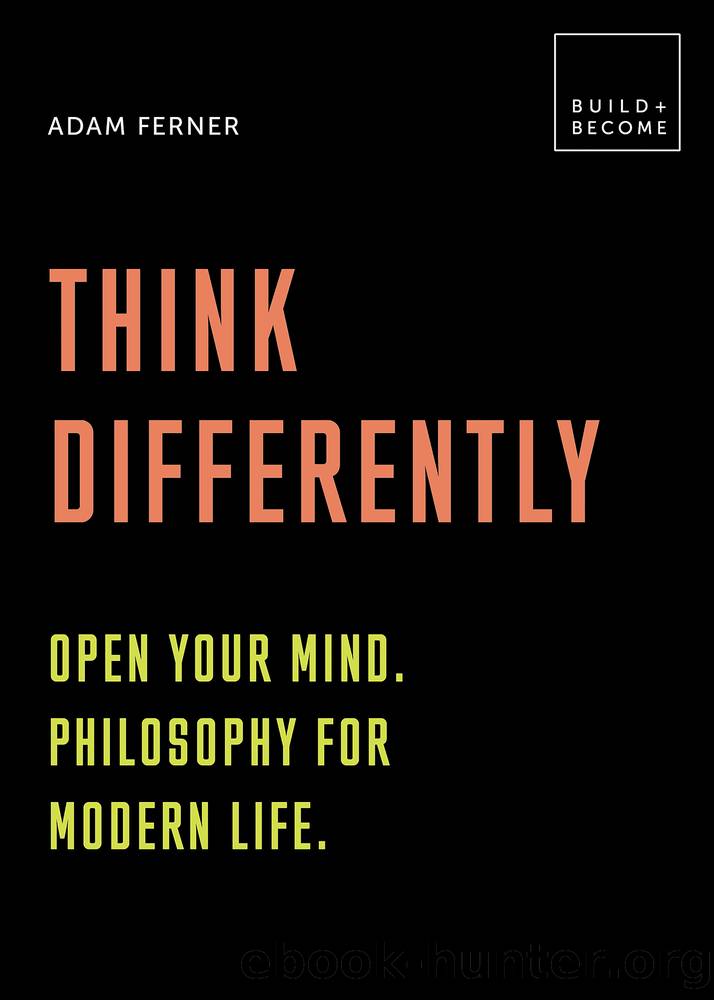Think Differently: Open Your Mind. Philosophy for Modern Life: 20 Thought-Provoking Lessons (BUILD+BECOME) by Adam Ferner

Author:Adam Ferner [Ferner, Adam]
Language: eng
Format: epub
Tags: philosophy, Ethics & Moral Philosophy, General, Social Science, popular culture
ISBN: 9781781317174
Google: pl5RDwAAQBAJ
Publisher: Aurum Press
Published: 2018-05-03T23:30:50.808184+00:00
EXAMINE YOURSELF LIBERALLY
âIf there were a word for the consensus within which electoral politics is debated in the industrialized world today, it may as well be liberalismâ.
Perhaps Appiahâs claim explains our universal grouchiness about paying taxes â yet even the political liberal thinks taxation is necessary for regulatory purposes (to fund the police and judiciary, and so forth).
On reflection, we might think the state should tax us for other services as well. Take national health care. Itâs a good idea â even though it falls outside the ambit of what the liberal state should do. The same is true of state welfare, which protects members of society who canât protect themselves. The political liberal, however, doesnât think this should be the stateâs job. If a person wants to give money, privately, to charity, they can, but it should be their individual choice.
In âLiberalism, Individuality, and Identityâ, Appiah puts pressure on what some might see to be this self-serving side of liberalism. And his objections emerge out of a metaphysical and political discussion.
Remember John Locke? In Lesson 9 we saw how fascinated he was by the concept of a person. In his Essay Concerning Human Understanding, he construed a person as a single, discrete entity, with its own distinctive desires. Thereâs no blurriness between persons, said Locke; youâre you, Iâm me, and never the twain shall meet (metaphysically speaking).
Appiah â like some of the other philosophers in this chapter â is wary of this Lockean picture. Drawing on the work of Michel Foucault and Charles Taylor, he suggests that every person, every self, is created âdialogicallyâ: through dialogue with others â friends and family, and broader society. The self, says Appiah, is ânot some authentic inner essence independent of the human world into which we have grown â but rather the product of our interaction from our earliest years with othersâ.
Think about your personal ambitions. Where did they come from? Did you think them up by yourself? Or were they conceived in conversation with parents, teachers and friends? With books, with films, with music? With other members of society? The Lockean idea of a discrete person, with a complete set of vacuum-packed desires, lies at the heart of political liberalism. But itâs metaphysically confused. Your identity, your selfhood, is inextricably connected with those of your fellow humans. So, Appiah says, the liberal thought that the self should be prioritized over sociability is poorly conceived.
This may not make paying your taxes any more palatable ⦠but it might, at least, make it more metaphysically coherent.
Download
This site does not store any files on its server. We only index and link to content provided by other sites. Please contact the content providers to delete copyright contents if any and email us, we'll remove relevant links or contents immediately.
| Coloring Books for Grown-Ups | Humor |
| Movies | Performing Arts |
| Pop Culture | Puzzles & Games |
| Radio | Sheet Music & Scores |
| Television | Trivia & Fun Facts |
Spare by Prince Harry The Duke of Sussex(5200)
Paper Towns by Green John(5194)
Machine Learning at Scale with H2O by Gregory Keys | David Whiting(4314)
Never by Ken Follett(3960)
Fairy Tale by Stephen King(3401)
Learning C# by Developing Games with Unity 2021 by Harrison Ferrone(3356)
Reminders of Him: A Novel by Colleen Hoover(3123)
The Man Who Died Twice by Richard Osman(3082)
Fantastic Beasts and Where to Find Them: Illustrated edition by J.K. Rowling & Newt Scamander(3027)
Will by Will Smith(2924)
0041152001443424520 .pdf by Unknown(2849)
How The Mind Works by Steven Pinker(2818)
Never Lie: An addictive psychological thriller by Freida McFadden(2630)
Fantastic Beasts and Where to Find Them: The Original Screenplay by J. K. Rowling(2518)
It Starts With Us (It Ends with Us #2) by Colleen Hoover(2370)
Rationality by Steven Pinker(2368)
Borders by unknow(2319)
The God delusion by Richard Dawkins(2312)
Friends, Lovers, and the Big Terrible Thing by Matthew Perry(2234)
